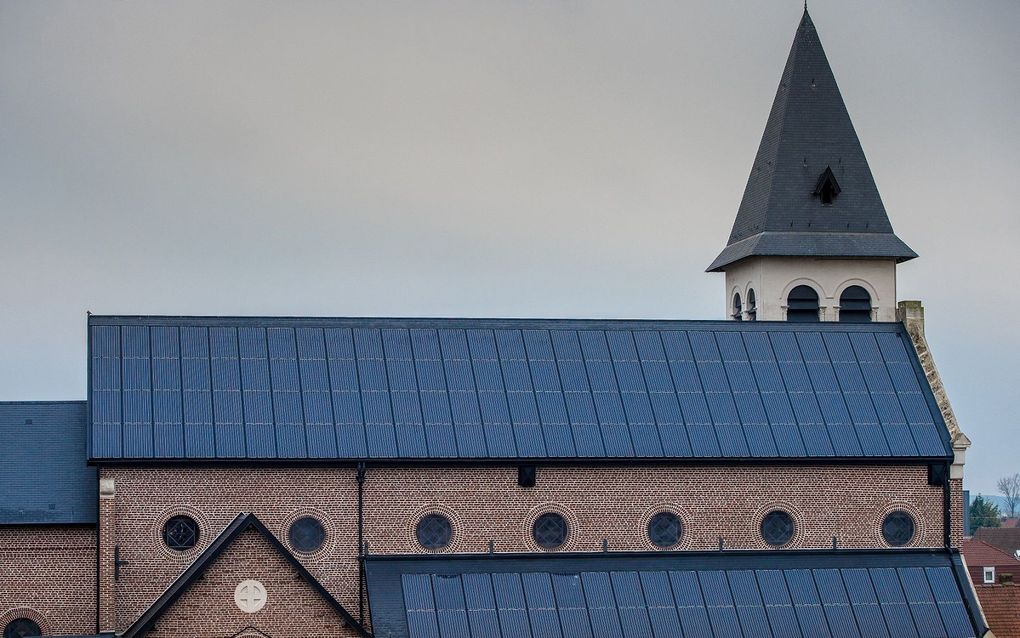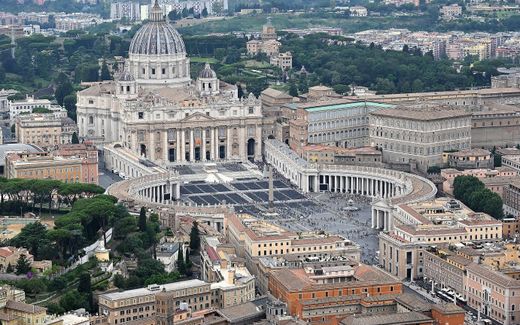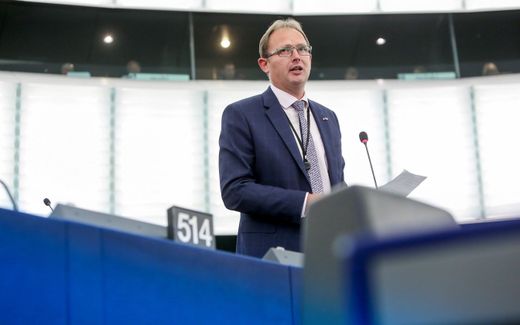Churches prepare for winter with high energy prices

Solar panels installed on the roof of the Saint-Waast church in Loos-en-Gohelle, northern France. Photo AFP, PHilippe Huguen
European Union
As energy prices continue to rise and temperatures drop, churches have to find ways to pay their bills.
For some churches, the amount at the bottom of the energy bill quadruples, Tom Peters says. Peters is an advisor for the Dutch collective "Energie voor Kerken" (translated as "Energy for churches). The company buys and sells electricity and gas to churches in the Netherlands.
Usually, the company can buy gas relatively cheap, as it takes large amounts simultaneously. Currently, they are still able to use the gas they stored in 2020. However, at the end of this year, new gas will have to be bought, Peters tells the Dutch daily Reformatorisch Dagblad.
He warns that some churches may have to be three or four times as much for their energy as they did up till now. That leads to startled reactions, Peters says. Some churches must reconsider their financial plan because they will be short of money. Others consider moving their church services online again so they do not have to use their church building. A different solution churches see is making their buildings more energy efficient.
Many factors influence the energy price. Peters does not dare to predict what the market will do. "If the winter is cold, the price will skyrocket. But if the winter is mild, some price decrease is also possible."
Temperature down
Some churches save energy by turning their heating down. One of them is the Reformed Church in the Dutch town of Ede in the middle of the Netherlands. The president of the steward commission of the church, Addy Hekking, says that the local congregation has five church buildings and one community building. "We pay about 90,000 euros for energy every year", he says to the Reformatorisch Dagblad.
Until now, the church did not have to deal with high energy prices, as its gas contract is still valid until April 2023. However, if a new contract will be thrice or four times as expensive as the current bill, the church commission has several solutions. "We would not be able to afford that", Hekking says. "Therefore, we have gathered as church stewards to see what we can do."
The church could, for example, turn down the heater a degree or even turn it off during church services when there are many people in the building. Another solution is monitoring energy use so the church can intervene when usage peaks. According to Hekking, informing churchwardens on how to save energy is essential. "That way, they will not leave the heating on all night." The church will ask the congregation to donate more money if nothing avails.
Merging church services or moving to online services is not an option right now, Hekking says. That is different for activities during the week: "We want to try to do those as much as possible in the same building." Also, renovating the church to make it more energy efficient is no possibility at the moment. "We cannot pay for these investments right now."
More donations
If prices rise, there are always members who donate more money to the church, Gert ten Bolscher notices. Ten Bolscher is the Dutch director of the Bureau voor Kerkelijke Dienstverlening (Eclessiastical Services) of the Netherlands Reformed Congregations. "As long as the collections bring in enough money, the rising energy costs are not a problem."
Ten Bolscher has not heard of churches that cannot pay their energy bill anymore. However, he sees that some congregations worry about the coming winter. Instead, he notices that churches start to save money where they can. They ask themselves whether they should heat the churches as much as last year or whether it is really necessary to heat the kitchen in the church building as well. "With common sense, it is possible to save quite a bit of money."
The Bureau voor Kerkelijke Dienstverlening also helps churches by pointing out subsidies they can request from the government, for example.
Postponing large renovations
The Christian Reformed Church in the Dutch town of Urk will be able to pay its energy bill even if prices rise. However, other plans are postponed, such as the church's renovation. Harco Mulder, the churchwarden of the congregation, tells the Reformatorisch Dagblad that the church's roof needs replacement. Furthermore, the meeting rooms are getting old.
However, with the rising energy prices, the church has to rethink its priorities. "We are looking at how we can save energy. The church is not insulated very well, so we want to deal with that first. We are considering insulating the walls and the roof and installing a new ventilation system that reuses heat."
In addition, the church just got a new heater, which can be operated from a distance. "Usually, I turned on the heating at 12 already when catechism classes started at 17. Now, I can turn it on an hour before from my home."
The custodian does not favour turning down the heater on Sunday. He argues that people should not be distracted by the cold when listening to God's Word.
Even though there are several churches of the denomination in the town of Urk, they do not cooperate in energy-saving measures, Mulder says. "Every building is different and has its own possibilities."
Oslo sanctuary will be kept at 15 degrees
In Oslo (Norway), churches will keep the temperature at 15 degrees to save energy. Custodian Kjetil Haga from Oslo, furthermore, says that it might be appropriate to close some buildings as well.
“We must be prepared to keep our coats on during church services, weddings and funerals”, Haga says in a press release, as reported by Dagen. He hopes and believes that “with lowered temperatures and not too many closed churches, we will avoid further measures.”
The usual temperature in churches has been between 20 and 22 degrees, Vart Land writes. By reducing that to 15 degrees, the churches expect to save about 30 per cent of electricity consumption. Haga says that the churches cannot afford the current electricity costs. “There are 65 churches in Oslo and many large rooms that are demanding to heat.”
He adds that churches play an important role as meeting place for people in difficult situations. Therefore, he wants to avoid the closure of churches as much as possible.
Related Articles






